PSYC1010 Report: Daniel Radcliffe and Obsessive-Compulsive Disorder
VerifiedAdded on 2023/05/31
|11
|2739
|137
Report
AI Summary
This psychology report analyzes Daniel Radcliffe's experience with Obsessive-Compulsive Disorder (OCD), examining his behaviors through the lens of learning theories, specifically behavioral conditioning. It delves into the cognitive mediational theory to explain the emotional aspects of OCD and discusses the potential causes, including brain differences, genetic components, and sociocultural factors. The report also explores the impact of OCD on social interactions, including issues like bullying, depression, and low self-esteem, while considering the influence of others on individuals with OCD. Furthermore, the report highlights classroom implications and strategies for educators to support students with OCD, emphasizing the importance of understanding and addressing their unique challenges. The report concludes with a summary of the findings, offering insights into the psychological underpinnings of OCD and its multifaceted effects.
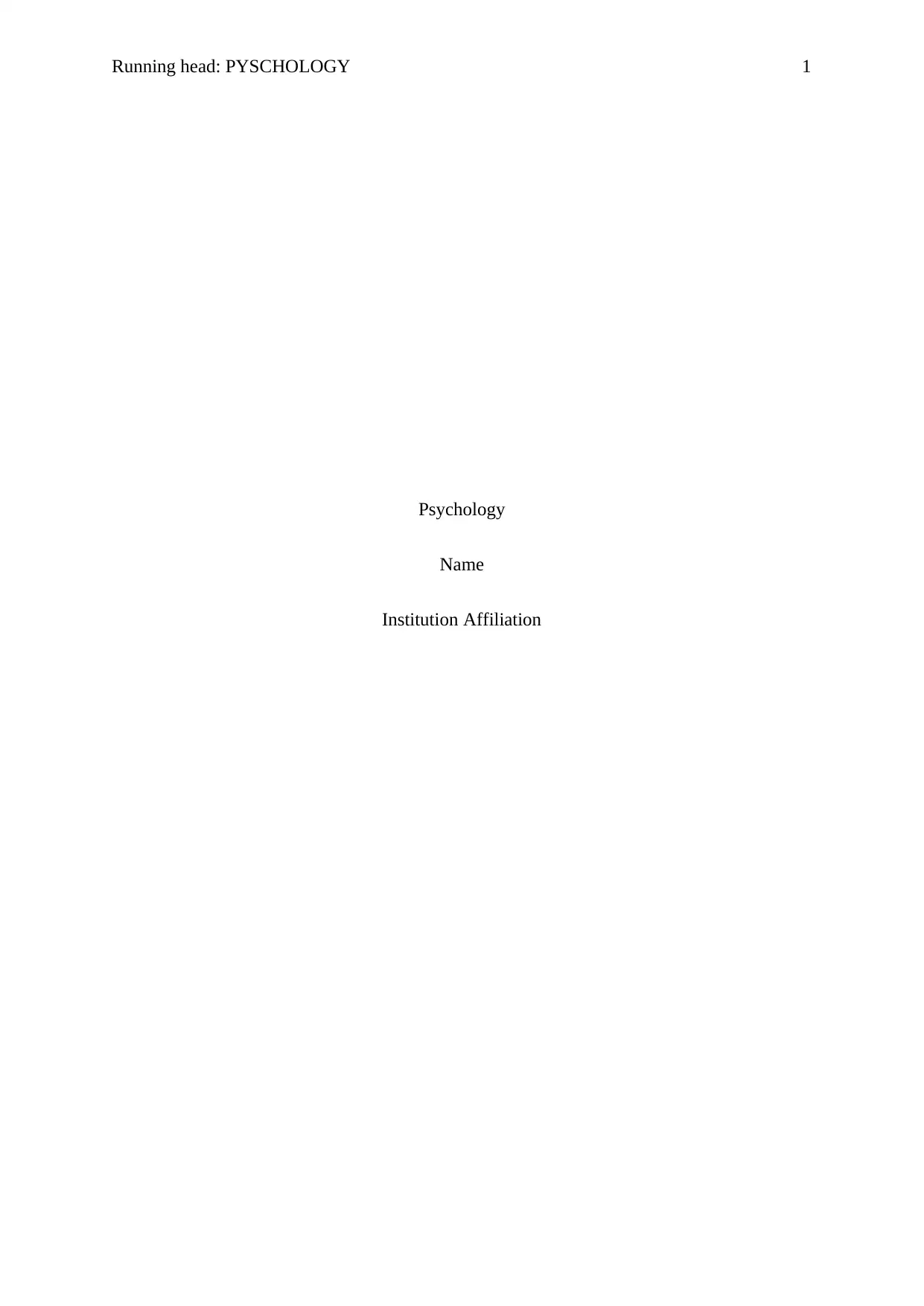
Running head: PYSCHOLOGY 1
Psychology
Name
Institution Affiliation
Psychology
Name
Institution Affiliation
Paraphrase This Document
Need a fresh take? Get an instant paraphrase of this document with our AI Paraphraser
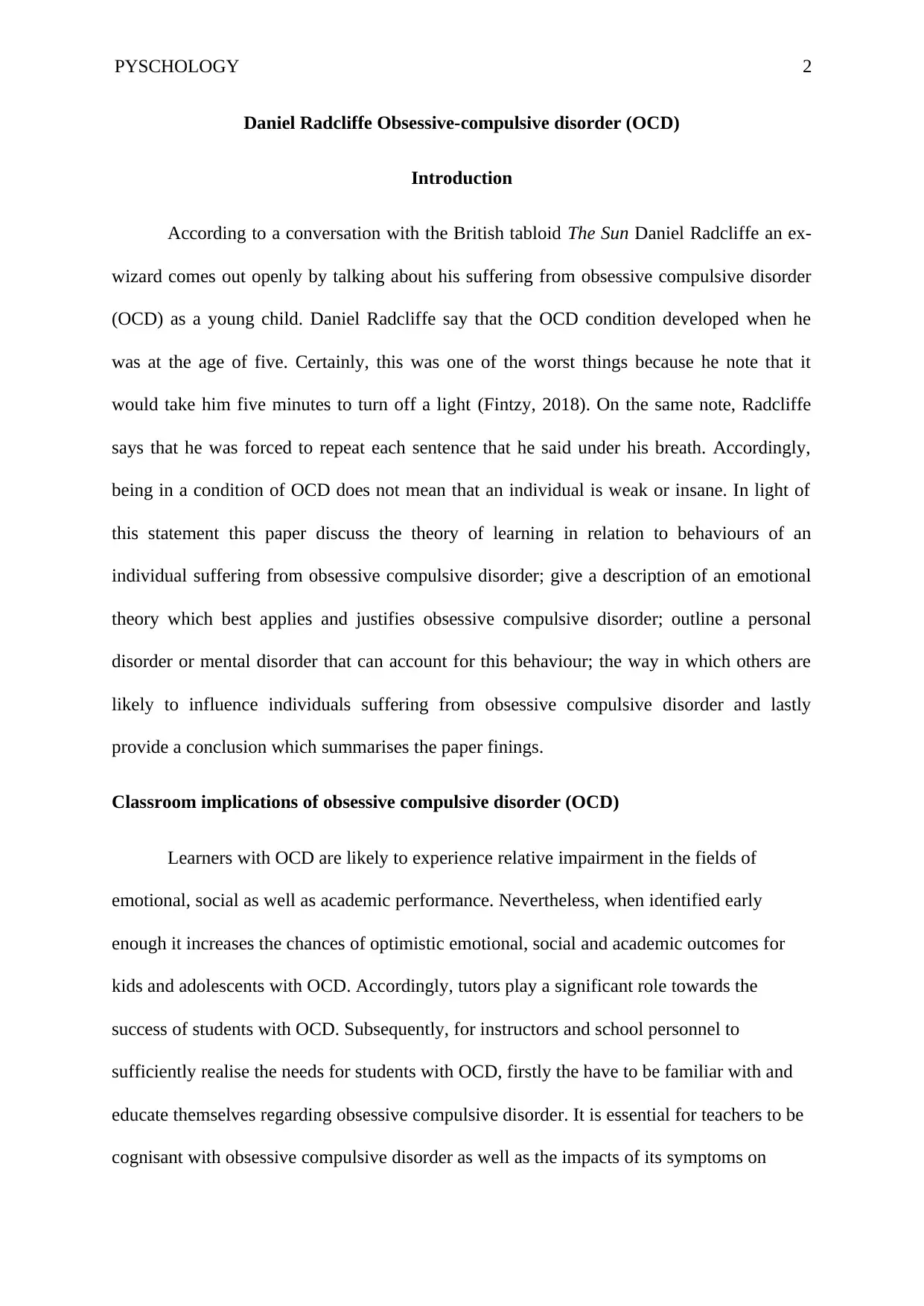
PYSCHOLOGY 2
Daniel Radcliffe Obsessive-compulsive disorder (OCD)
Introduction
According to a conversation with the British tabloid The Sun Daniel Radcliffe an ex-
wizard comes out openly by talking about his suffering from obsessive compulsive disorder
(OCD) as a young child. Daniel Radcliffe say that the OCD condition developed when he
was at the age of five. Certainly, this was one of the worst things because he note that it
would take him five minutes to turn off a light (Fintzy, 2018). On the same note, Radcliffe
says that he was forced to repeat each sentence that he said under his breath. Accordingly,
being in a condition of OCD does not mean that an individual is weak or insane. In light of
this statement this paper discuss the theory of learning in relation to behaviours of an
individual suffering from obsessive compulsive disorder; give a description of an emotional
theory which best applies and justifies obsessive compulsive disorder; outline a personal
disorder or mental disorder that can account for this behaviour; the way in which others are
likely to influence individuals suffering from obsessive compulsive disorder and lastly
provide a conclusion which summarises the paper finings.
Classroom implications of obsessive compulsive disorder (OCD)
Learners with OCD are likely to experience relative impairment in the fields of
emotional, social as well as academic performance. Nevertheless, when identified early
enough it increases the chances of optimistic emotional, social and academic outcomes for
kids and adolescents with OCD. Accordingly, tutors play a significant role towards the
success of students with OCD. Subsequently, for instructors and school personnel to
sufficiently realise the needs for students with OCD, firstly the have to be familiar with and
educate themselves regarding obsessive compulsive disorder. It is essential for teachers to be
cognisant with obsessive compulsive disorder as well as the impacts of its symptoms on
Daniel Radcliffe Obsessive-compulsive disorder (OCD)
Introduction
According to a conversation with the British tabloid The Sun Daniel Radcliffe an ex-
wizard comes out openly by talking about his suffering from obsessive compulsive disorder
(OCD) as a young child. Daniel Radcliffe say that the OCD condition developed when he
was at the age of five. Certainly, this was one of the worst things because he note that it
would take him five minutes to turn off a light (Fintzy, 2018). On the same note, Radcliffe
says that he was forced to repeat each sentence that he said under his breath. Accordingly,
being in a condition of OCD does not mean that an individual is weak or insane. In light of
this statement this paper discuss the theory of learning in relation to behaviours of an
individual suffering from obsessive compulsive disorder; give a description of an emotional
theory which best applies and justifies obsessive compulsive disorder; outline a personal
disorder or mental disorder that can account for this behaviour; the way in which others are
likely to influence individuals suffering from obsessive compulsive disorder and lastly
provide a conclusion which summarises the paper finings.
Classroom implications of obsessive compulsive disorder (OCD)
Learners with OCD are likely to experience relative impairment in the fields of
emotional, social as well as academic performance. Nevertheless, when identified early
enough it increases the chances of optimistic emotional, social and academic outcomes for
kids and adolescents with OCD. Accordingly, tutors play a significant role towards the
success of students with OCD. Subsequently, for instructors and school personnel to
sufficiently realise the needs for students with OCD, firstly the have to be familiar with and
educate themselves regarding obsessive compulsive disorder. It is essential for teachers to be
cognisant with obsessive compulsive disorder as well as the impacts of its symptoms on
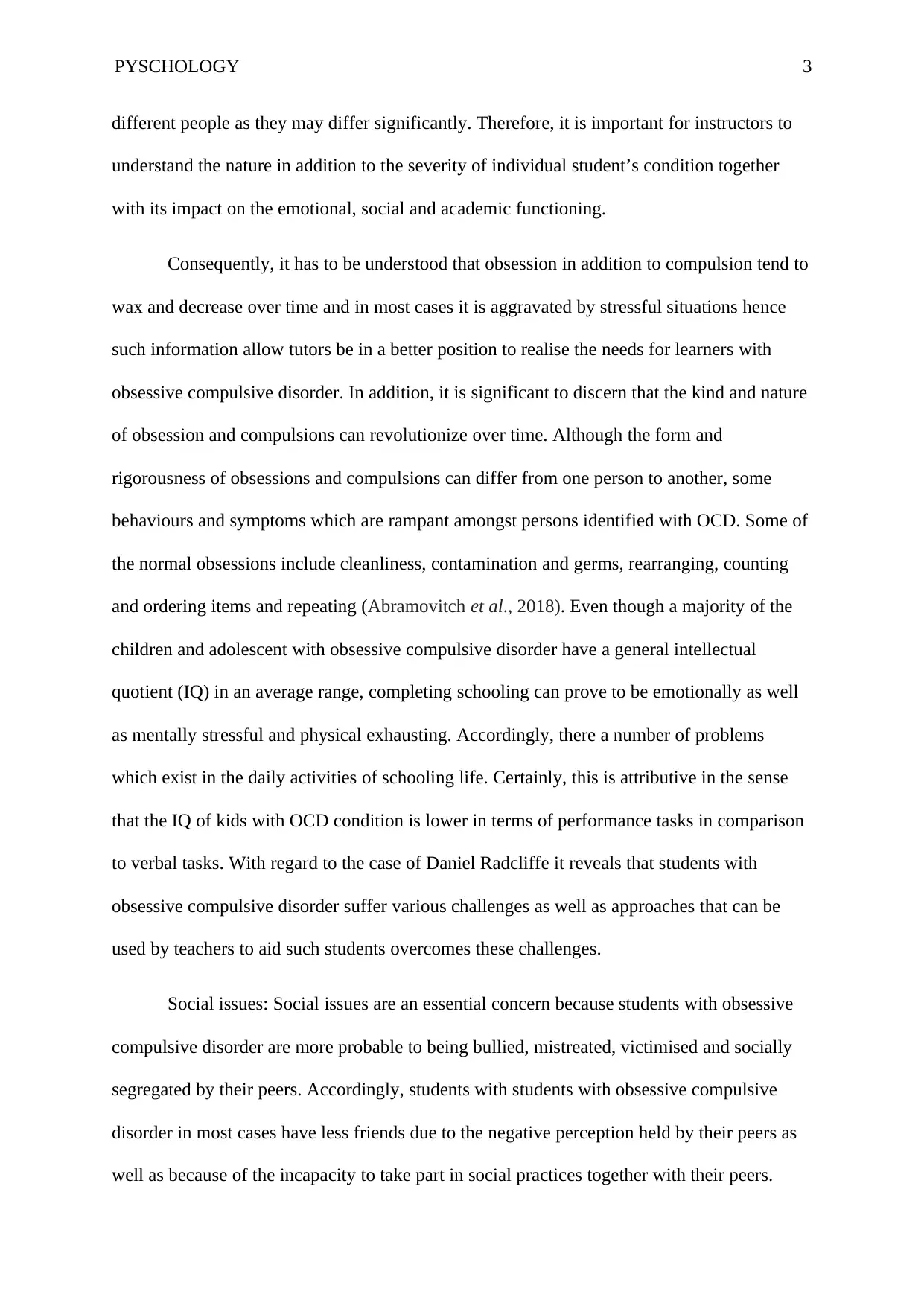
PYSCHOLOGY 3
different people as they may differ significantly. Therefore, it is important for instructors to
understand the nature in addition to the severity of individual student’s condition together
with its impact on the emotional, social and academic functioning.
Consequently, it has to be understood that obsession in addition to compulsion tend to
wax and decrease over time and in most cases it is aggravated by stressful situations hence
such information allow tutors be in a better position to realise the needs for learners with
obsessive compulsive disorder. In addition, it is significant to discern that the kind and nature
of obsession and compulsions can revolutionize over time. Although the form and
rigorousness of obsessions and compulsions can differ from one person to another, some
behaviours and symptoms which are rampant amongst persons identified with OCD. Some of
the normal obsessions include cleanliness, contamination and germs, rearranging, counting
and ordering items and repeating (Abramovitch et al., 2018). Even though a majority of the
children and adolescent with obsessive compulsive disorder have a general intellectual
quotient (IQ) in an average range, completing schooling can prove to be emotionally as well
as mentally stressful and physical exhausting. Accordingly, there a number of problems
which exist in the daily activities of schooling life. Certainly, this is attributive in the sense
that the IQ of kids with OCD condition is lower in terms of performance tasks in comparison
to verbal tasks. With regard to the case of Daniel Radcliffe it reveals that students with
obsessive compulsive disorder suffer various challenges as well as approaches that can be
used by teachers to aid such students overcomes these challenges.
Social issues: Social issues are an essential concern because students with obsessive
compulsive disorder are more probable to being bullied, mistreated, victimised and socially
segregated by their peers. Accordingly, students with students with obsessive compulsive
disorder in most cases have less friends due to the negative perception held by their peers as
well as because of the incapacity to take part in social practices together with their peers.
different people as they may differ significantly. Therefore, it is important for instructors to
understand the nature in addition to the severity of individual student’s condition together
with its impact on the emotional, social and academic functioning.
Consequently, it has to be understood that obsession in addition to compulsion tend to
wax and decrease over time and in most cases it is aggravated by stressful situations hence
such information allow tutors be in a better position to realise the needs for learners with
obsessive compulsive disorder. In addition, it is significant to discern that the kind and nature
of obsession and compulsions can revolutionize over time. Although the form and
rigorousness of obsessions and compulsions can differ from one person to another, some
behaviours and symptoms which are rampant amongst persons identified with OCD. Some of
the normal obsessions include cleanliness, contamination and germs, rearranging, counting
and ordering items and repeating (Abramovitch et al., 2018). Even though a majority of the
children and adolescent with obsessive compulsive disorder have a general intellectual
quotient (IQ) in an average range, completing schooling can prove to be emotionally as well
as mentally stressful and physical exhausting. Accordingly, there a number of problems
which exist in the daily activities of schooling life. Certainly, this is attributive in the sense
that the IQ of kids with OCD condition is lower in terms of performance tasks in comparison
to verbal tasks. With regard to the case of Daniel Radcliffe it reveals that students with
obsessive compulsive disorder suffer various challenges as well as approaches that can be
used by teachers to aid such students overcomes these challenges.
Social issues: Social issues are an essential concern because students with obsessive
compulsive disorder are more probable to being bullied, mistreated, victimised and socially
segregated by their peers. Accordingly, students with students with obsessive compulsive
disorder in most cases have less friends due to the negative perception held by their peers as
well as because of the incapacity to take part in social practices together with their peers.
⊘ This is a preview!⊘
Do you want full access?
Subscribe today to unlock all pages.

Trusted by 1+ million students worldwide
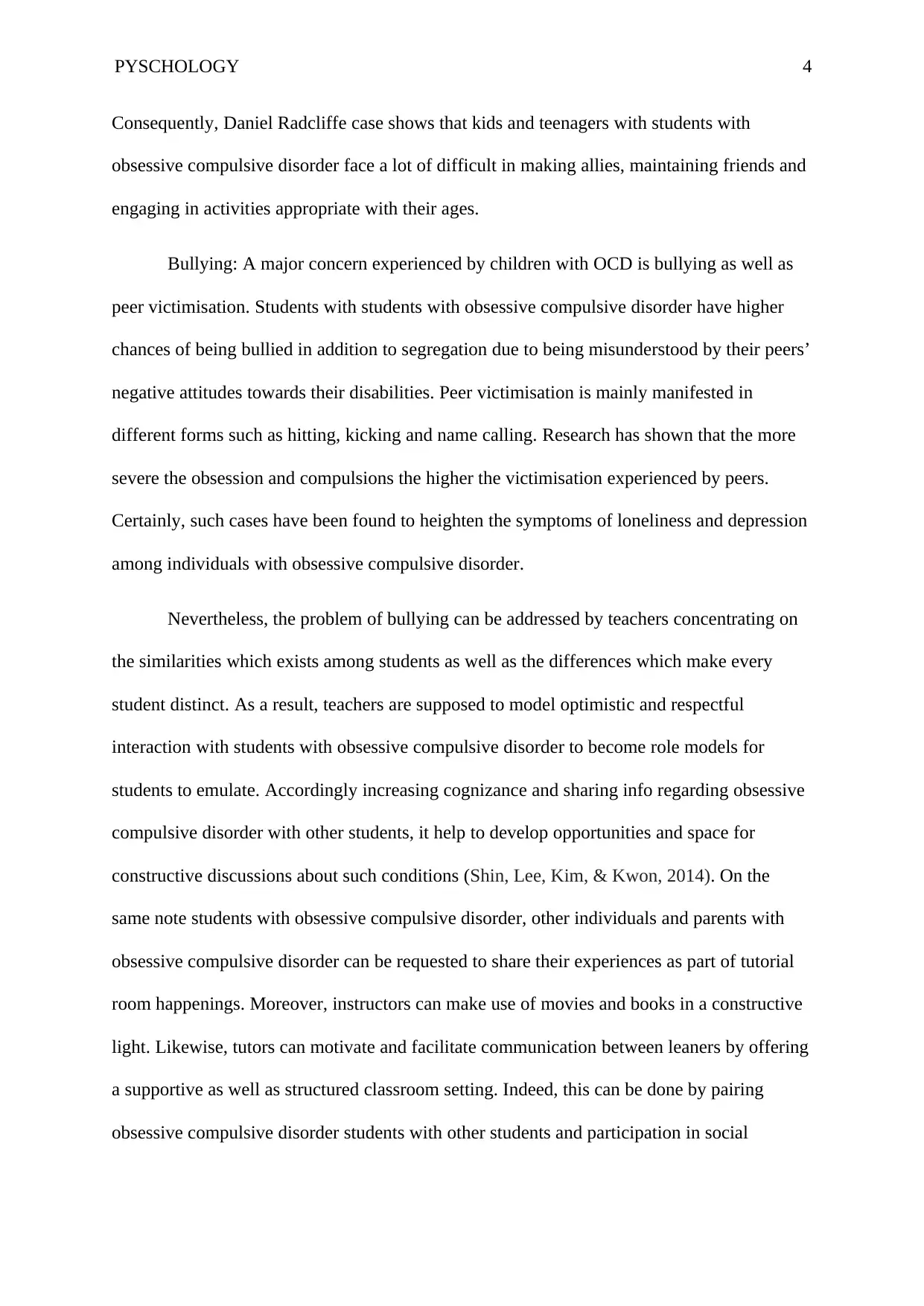
PYSCHOLOGY 4
Consequently, Daniel Radcliffe case shows that kids and teenagers with students with
obsessive compulsive disorder face a lot of difficult in making allies, maintaining friends and
engaging in activities appropriate with their ages.
Bullying: A major concern experienced by children with OCD is bullying as well as
peer victimisation. Students with students with obsessive compulsive disorder have higher
chances of being bullied in addition to segregation due to being misunderstood by their peers’
negative attitudes towards their disabilities. Peer victimisation is mainly manifested in
different forms such as hitting, kicking and name calling. Research has shown that the more
severe the obsession and compulsions the higher the victimisation experienced by peers.
Certainly, such cases have been found to heighten the symptoms of loneliness and depression
among individuals with obsessive compulsive disorder.
Nevertheless, the problem of bullying can be addressed by teachers concentrating on
the similarities which exists among students as well as the differences which make every
student distinct. As a result, teachers are supposed to model optimistic and respectful
interaction with students with obsessive compulsive disorder to become role models for
students to emulate. Accordingly increasing cognizance and sharing info regarding obsessive
compulsive disorder with other students, it help to develop opportunities and space for
constructive discussions about such conditions (Shin, Lee, Kim, & Kwon, 2014). On the
same note students with obsessive compulsive disorder, other individuals and parents with
obsessive compulsive disorder can be requested to share their experiences as part of tutorial
room happenings. Moreover, instructors can make use of movies and books in a constructive
light. Likewise, tutors can motivate and facilitate communication between leaners by offering
a supportive as well as structured classroom setting. Indeed, this can be done by pairing
obsessive compulsive disorder students with other students and participation in social
Consequently, Daniel Radcliffe case shows that kids and teenagers with students with
obsessive compulsive disorder face a lot of difficult in making allies, maintaining friends and
engaging in activities appropriate with their ages.
Bullying: A major concern experienced by children with OCD is bullying as well as
peer victimisation. Students with students with obsessive compulsive disorder have higher
chances of being bullied in addition to segregation due to being misunderstood by their peers’
negative attitudes towards their disabilities. Peer victimisation is mainly manifested in
different forms such as hitting, kicking and name calling. Research has shown that the more
severe the obsession and compulsions the higher the victimisation experienced by peers.
Certainly, such cases have been found to heighten the symptoms of loneliness and depression
among individuals with obsessive compulsive disorder.
Nevertheless, the problem of bullying can be addressed by teachers concentrating on
the similarities which exists among students as well as the differences which make every
student distinct. As a result, teachers are supposed to model optimistic and respectful
interaction with students with obsessive compulsive disorder to become role models for
students to emulate. Accordingly increasing cognizance and sharing info regarding obsessive
compulsive disorder with other students, it help to develop opportunities and space for
constructive discussions about such conditions (Shin, Lee, Kim, & Kwon, 2014). On the
same note students with obsessive compulsive disorder, other individuals and parents with
obsessive compulsive disorder can be requested to share their experiences as part of tutorial
room happenings. Moreover, instructors can make use of movies and books in a constructive
light. Likewise, tutors can motivate and facilitate communication between leaners by offering
a supportive as well as structured classroom setting. Indeed, this can be done by pairing
obsessive compulsive disorder students with other students and participation in social
Paraphrase This Document
Need a fresh take? Get an instant paraphrase of this document with our AI Paraphraser
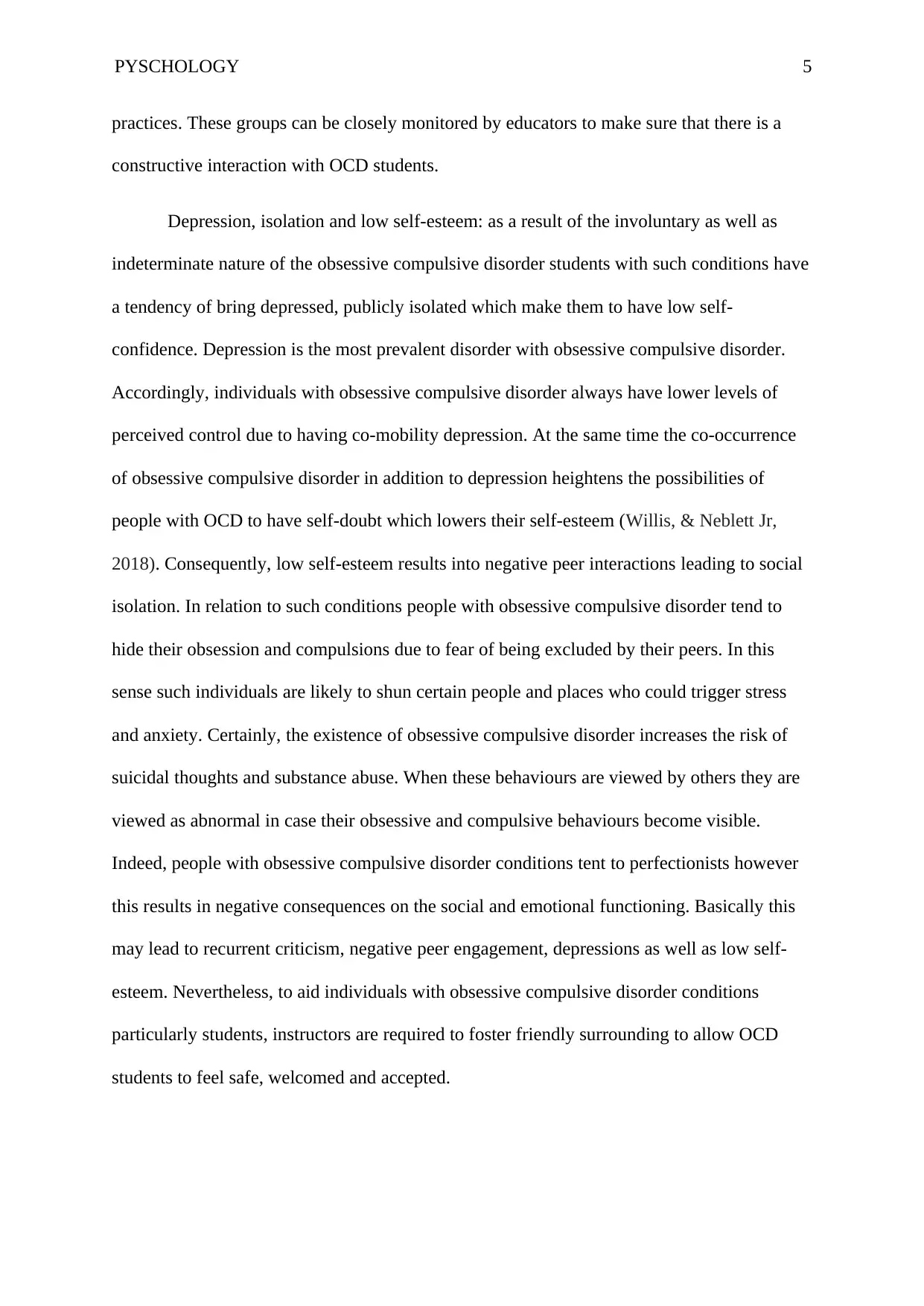
PYSCHOLOGY 5
practices. These groups can be closely monitored by educators to make sure that there is a
constructive interaction with OCD students.
Depression, isolation and low self-esteem: as a result of the involuntary as well as
indeterminate nature of the obsessive compulsive disorder students with such conditions have
a tendency of bring depressed, publicly isolated which make them to have low self-
confidence. Depression is the most prevalent disorder with obsessive compulsive disorder.
Accordingly, individuals with obsessive compulsive disorder always have lower levels of
perceived control due to having co-mobility depression. At the same time the co-occurrence
of obsessive compulsive disorder in addition to depression heightens the possibilities of
people with OCD to have self-doubt which lowers their self-esteem (Willis, & Neblett Jr,
2018). Consequently, low self-esteem results into negative peer interactions leading to social
isolation. In relation to such conditions people with obsessive compulsive disorder tend to
hide their obsession and compulsions due to fear of being excluded by their peers. In this
sense such individuals are likely to shun certain people and places who could trigger stress
and anxiety. Certainly, the existence of obsessive compulsive disorder increases the risk of
suicidal thoughts and substance abuse. When these behaviours are viewed by others they are
viewed as abnormal in case their obsessive and compulsive behaviours become visible.
Indeed, people with obsessive compulsive disorder conditions tent to perfectionists however
this results in negative consequences on the social and emotional functioning. Basically this
may lead to recurrent criticism, negative peer engagement, depressions as well as low self-
esteem. Nevertheless, to aid individuals with obsessive compulsive disorder conditions
particularly students, instructors are required to foster friendly surrounding to allow OCD
students to feel safe, welcomed and accepted.
practices. These groups can be closely monitored by educators to make sure that there is a
constructive interaction with OCD students.
Depression, isolation and low self-esteem: as a result of the involuntary as well as
indeterminate nature of the obsessive compulsive disorder students with such conditions have
a tendency of bring depressed, publicly isolated which make them to have low self-
confidence. Depression is the most prevalent disorder with obsessive compulsive disorder.
Accordingly, individuals with obsessive compulsive disorder always have lower levels of
perceived control due to having co-mobility depression. At the same time the co-occurrence
of obsessive compulsive disorder in addition to depression heightens the possibilities of
people with OCD to have self-doubt which lowers their self-esteem (Willis, & Neblett Jr,
2018). Consequently, low self-esteem results into negative peer interactions leading to social
isolation. In relation to such conditions people with obsessive compulsive disorder tend to
hide their obsession and compulsions due to fear of being excluded by their peers. In this
sense such individuals are likely to shun certain people and places who could trigger stress
and anxiety. Certainly, the existence of obsessive compulsive disorder increases the risk of
suicidal thoughts and substance abuse. When these behaviours are viewed by others they are
viewed as abnormal in case their obsessive and compulsive behaviours become visible.
Indeed, people with obsessive compulsive disorder conditions tent to perfectionists however
this results in negative consequences on the social and emotional functioning. Basically this
may lead to recurrent criticism, negative peer engagement, depressions as well as low self-
esteem. Nevertheless, to aid individuals with obsessive compulsive disorder conditions
particularly students, instructors are required to foster friendly surrounding to allow OCD
students to feel safe, welcomed and accepted.
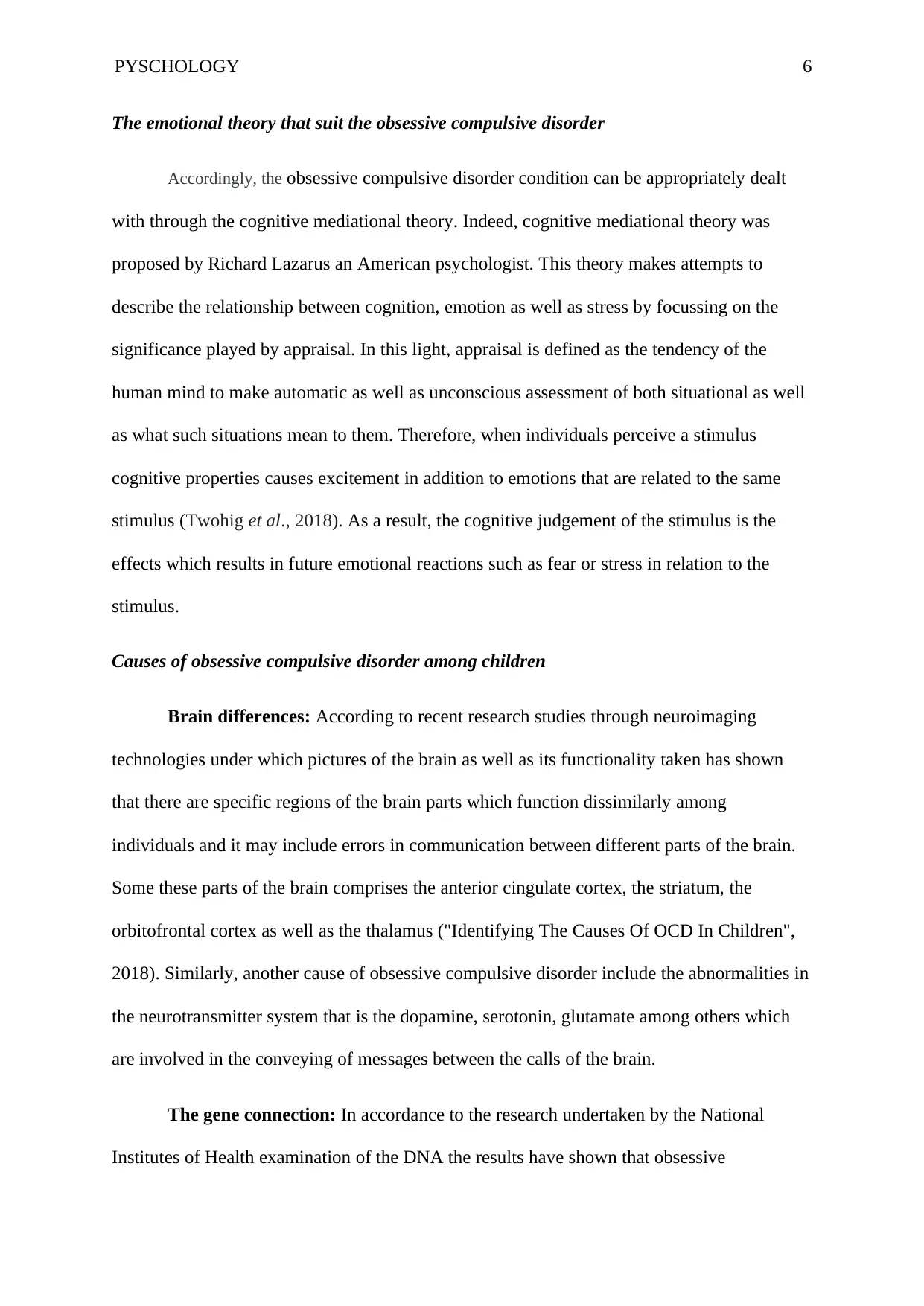
PYSCHOLOGY 6
The emotional theory that suit the obsessive compulsive disorder
Accordingly, the obsessive compulsive disorder condition can be appropriately dealt
with through the cognitive mediational theory. Indeed, cognitive mediational theory was
proposed by Richard Lazarus an American psychologist. This theory makes attempts to
describe the relationship between cognition, emotion as well as stress by focussing on the
significance played by appraisal. In this light, appraisal is defined as the tendency of the
human mind to make automatic as well as unconscious assessment of both situational as well
as what such situations mean to them. Therefore, when individuals perceive a stimulus
cognitive properties causes excitement in addition to emotions that are related to the same
stimulus (Twohig et al., 2018). As a result, the cognitive judgement of the stimulus is the
effects which results in future emotional reactions such as fear or stress in relation to the
stimulus.
Causes of obsessive compulsive disorder among children
Brain differences: According to recent research studies through neuroimaging
technologies under which pictures of the brain as well as its functionality taken has shown
that there are specific regions of the brain parts which function dissimilarly among
individuals and it may include errors in communication between different parts of the brain.
Some these parts of the brain comprises the anterior cingulate cortex, the striatum, the
orbitofrontal cortex as well as the thalamus ("Identifying The Causes Of OCD In Children",
2018). Similarly, another cause of obsessive compulsive disorder include the abnormalities in
the neurotransmitter system that is the dopamine, serotonin, glutamate among others which
are involved in the conveying of messages between the calls of the brain.
The gene connection: In accordance to the research undertaken by the National
Institutes of Health examination of the DNA the results have shown that obsessive
The emotional theory that suit the obsessive compulsive disorder
Accordingly, the obsessive compulsive disorder condition can be appropriately dealt
with through the cognitive mediational theory. Indeed, cognitive mediational theory was
proposed by Richard Lazarus an American psychologist. This theory makes attempts to
describe the relationship between cognition, emotion as well as stress by focussing on the
significance played by appraisal. In this light, appraisal is defined as the tendency of the
human mind to make automatic as well as unconscious assessment of both situational as well
as what such situations mean to them. Therefore, when individuals perceive a stimulus
cognitive properties causes excitement in addition to emotions that are related to the same
stimulus (Twohig et al., 2018). As a result, the cognitive judgement of the stimulus is the
effects which results in future emotional reactions such as fear or stress in relation to the
stimulus.
Causes of obsessive compulsive disorder among children
Brain differences: According to recent research studies through neuroimaging
technologies under which pictures of the brain as well as its functionality taken has shown
that there are specific regions of the brain parts which function dissimilarly among
individuals and it may include errors in communication between different parts of the brain.
Some these parts of the brain comprises the anterior cingulate cortex, the striatum, the
orbitofrontal cortex as well as the thalamus ("Identifying The Causes Of OCD In Children",
2018). Similarly, another cause of obsessive compulsive disorder include the abnormalities in
the neurotransmitter system that is the dopamine, serotonin, glutamate among others which
are involved in the conveying of messages between the calls of the brain.
The gene connection: In accordance to the research undertaken by the National
Institutes of Health examination of the DNA the results have shown that obsessive
⊘ This is a preview!⊘
Do you want full access?
Subscribe today to unlock all pages.

Trusted by 1+ million students worldwide
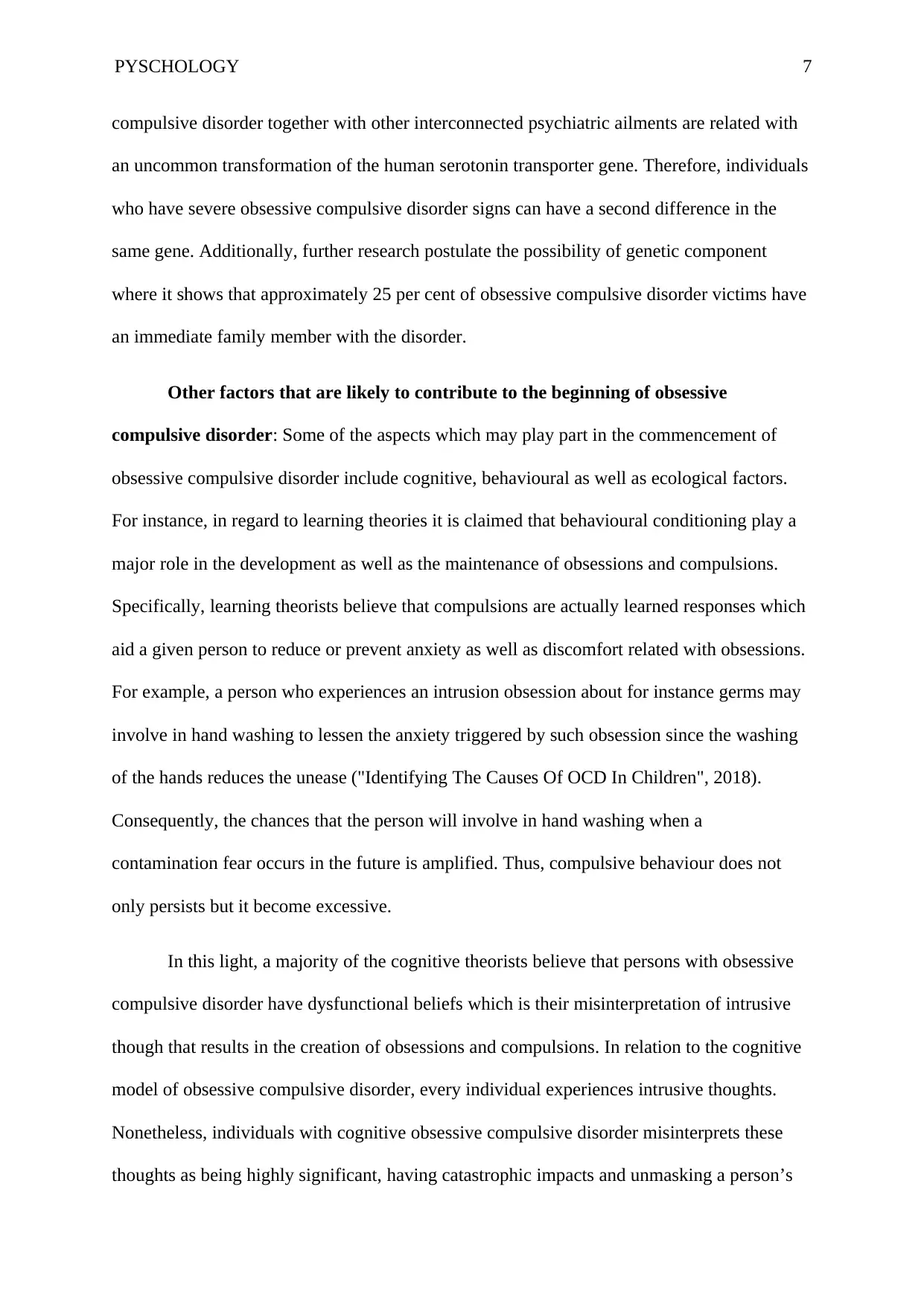
PYSCHOLOGY 7
compulsive disorder together with other interconnected psychiatric ailments are related with
an uncommon transformation of the human serotonin transporter gene. Therefore, individuals
who have severe obsessive compulsive disorder signs can have a second difference in the
same gene. Additionally, further research postulate the possibility of genetic component
where it shows that approximately 25 per cent of obsessive compulsive disorder victims have
an immediate family member with the disorder.
Other factors that are likely to contribute to the beginning of obsessive
compulsive disorder: Some of the aspects which may play part in the commencement of
obsessive compulsive disorder include cognitive, behavioural as well as ecological factors.
For instance, in regard to learning theories it is claimed that behavioural conditioning play a
major role in the development as well as the maintenance of obsessions and compulsions.
Specifically, learning theorists believe that compulsions are actually learned responses which
aid a given person to reduce or prevent anxiety as well as discomfort related with obsessions.
For example, a person who experiences an intrusion obsession about for instance germs may
involve in hand washing to lessen the anxiety triggered by such obsession since the washing
of the hands reduces the unease ("Identifying The Causes Of OCD In Children", 2018).
Consequently, the chances that the person will involve in hand washing when a
contamination fear occurs in the future is amplified. Thus, compulsive behaviour does not
only persists but it become excessive.
In this light, a majority of the cognitive theorists believe that persons with obsessive
compulsive disorder have dysfunctional beliefs which is their misinterpretation of intrusive
though that results in the creation of obsessions and compulsions. In relation to the cognitive
model of obsessive compulsive disorder, every individual experiences intrusive thoughts.
Nonetheless, individuals with cognitive obsessive compulsive disorder misinterprets these
thoughts as being highly significant, having catastrophic impacts and unmasking a person’s
compulsive disorder together with other interconnected psychiatric ailments are related with
an uncommon transformation of the human serotonin transporter gene. Therefore, individuals
who have severe obsessive compulsive disorder signs can have a second difference in the
same gene. Additionally, further research postulate the possibility of genetic component
where it shows that approximately 25 per cent of obsessive compulsive disorder victims have
an immediate family member with the disorder.
Other factors that are likely to contribute to the beginning of obsessive
compulsive disorder: Some of the aspects which may play part in the commencement of
obsessive compulsive disorder include cognitive, behavioural as well as ecological factors.
For instance, in regard to learning theories it is claimed that behavioural conditioning play a
major role in the development as well as the maintenance of obsessions and compulsions.
Specifically, learning theorists believe that compulsions are actually learned responses which
aid a given person to reduce or prevent anxiety as well as discomfort related with obsessions.
For example, a person who experiences an intrusion obsession about for instance germs may
involve in hand washing to lessen the anxiety triggered by such obsession since the washing
of the hands reduces the unease ("Identifying The Causes Of OCD In Children", 2018).
Consequently, the chances that the person will involve in hand washing when a
contamination fear occurs in the future is amplified. Thus, compulsive behaviour does not
only persists but it become excessive.
In this light, a majority of the cognitive theorists believe that persons with obsessive
compulsive disorder have dysfunctional beliefs which is their misinterpretation of intrusive
though that results in the creation of obsessions and compulsions. In relation to the cognitive
model of obsessive compulsive disorder, every individual experiences intrusive thoughts.
Nonetheless, individuals with cognitive obsessive compulsive disorder misinterprets these
thoughts as being highly significant, having catastrophic impacts and unmasking a person’s
Paraphrase This Document
Need a fresh take? Get an instant paraphrase of this document with our AI Paraphraser
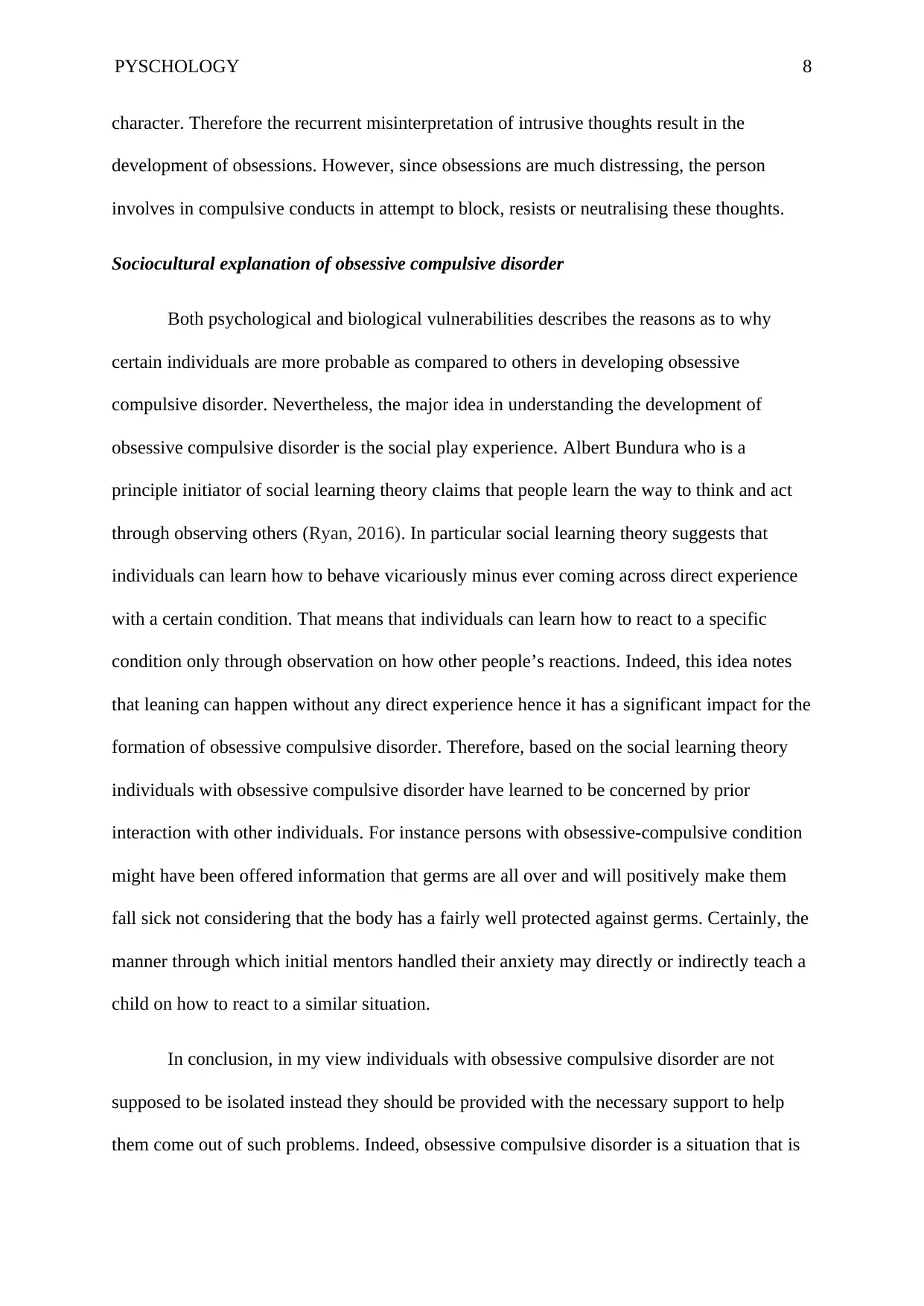
PYSCHOLOGY 8
character. Therefore the recurrent misinterpretation of intrusive thoughts result in the
development of obsessions. However, since obsessions are much distressing, the person
involves in compulsive conducts in attempt to block, resists or neutralising these thoughts.
Sociocultural explanation of obsessive compulsive disorder
Both psychological and biological vulnerabilities describes the reasons as to why
certain individuals are more probable as compared to others in developing obsessive
compulsive disorder. Nevertheless, the major idea in understanding the development of
obsessive compulsive disorder is the social play experience. Albert Bundura who is a
principle initiator of social learning theory claims that people learn the way to think and act
through observing others (Ryan, 2016). In particular social learning theory suggests that
individuals can learn how to behave vicariously minus ever coming across direct experience
with a certain condition. That means that individuals can learn how to react to a specific
condition only through observation on how other people’s reactions. Indeed, this idea notes
that leaning can happen without any direct experience hence it has a significant impact for the
formation of obsessive compulsive disorder. Therefore, based on the social learning theory
individuals with obsessive compulsive disorder have learned to be concerned by prior
interaction with other individuals. For instance persons with obsessive-compulsive condition
might have been offered information that germs are all over and will positively make them
fall sick not considering that the body has a fairly well protected against germs. Certainly, the
manner through which initial mentors handled their anxiety may directly or indirectly teach a
child on how to react to a similar situation.
In conclusion, in my view individuals with obsessive compulsive disorder are not
supposed to be isolated instead they should be provided with the necessary support to help
them come out of such problems. Indeed, obsessive compulsive disorder is a situation that is
character. Therefore the recurrent misinterpretation of intrusive thoughts result in the
development of obsessions. However, since obsessions are much distressing, the person
involves in compulsive conducts in attempt to block, resists or neutralising these thoughts.
Sociocultural explanation of obsessive compulsive disorder
Both psychological and biological vulnerabilities describes the reasons as to why
certain individuals are more probable as compared to others in developing obsessive
compulsive disorder. Nevertheless, the major idea in understanding the development of
obsessive compulsive disorder is the social play experience. Albert Bundura who is a
principle initiator of social learning theory claims that people learn the way to think and act
through observing others (Ryan, 2016). In particular social learning theory suggests that
individuals can learn how to behave vicariously minus ever coming across direct experience
with a certain condition. That means that individuals can learn how to react to a specific
condition only through observation on how other people’s reactions. Indeed, this idea notes
that leaning can happen without any direct experience hence it has a significant impact for the
formation of obsessive compulsive disorder. Therefore, based on the social learning theory
individuals with obsessive compulsive disorder have learned to be concerned by prior
interaction with other individuals. For instance persons with obsessive-compulsive condition
might have been offered information that germs are all over and will positively make them
fall sick not considering that the body has a fairly well protected against germs. Certainly, the
manner through which initial mentors handled their anxiety may directly or indirectly teach a
child on how to react to a similar situation.
In conclusion, in my view individuals with obsessive compulsive disorder are not
supposed to be isolated instead they should be provided with the necessary support to help
them come out of such problems. Indeed, obsessive compulsive disorder is a situation that is
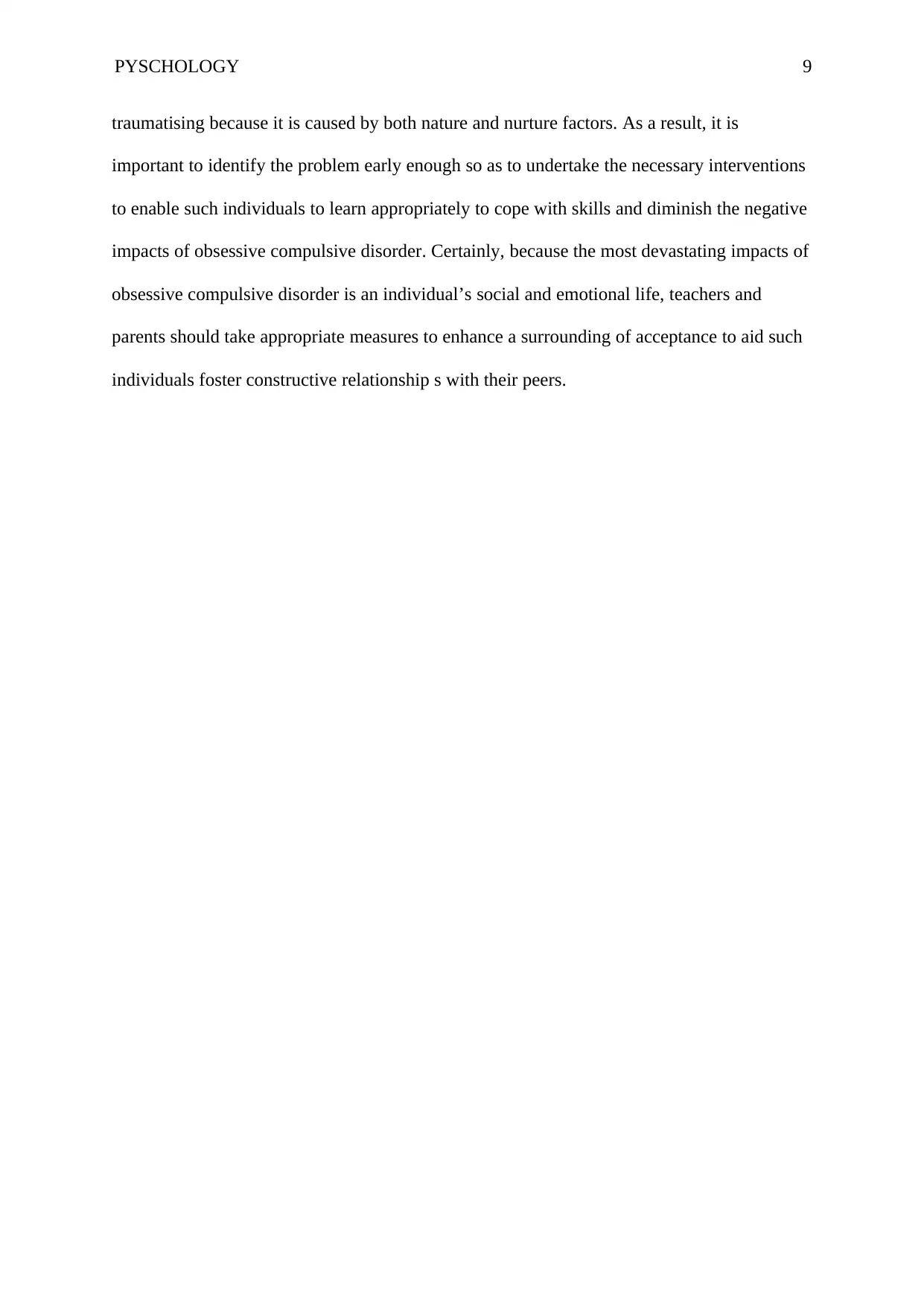
PYSCHOLOGY 9
traumatising because it is caused by both nature and nurture factors. As a result, it is
important to identify the problem early enough so as to undertake the necessary interventions
to enable such individuals to learn appropriately to cope with skills and diminish the negative
impacts of obsessive compulsive disorder. Certainly, because the most devastating impacts of
obsessive compulsive disorder is an individual’s social and emotional life, teachers and
parents should take appropriate measures to enhance a surrounding of acceptance to aid such
individuals foster constructive relationship s with their peers.
traumatising because it is caused by both nature and nurture factors. As a result, it is
important to identify the problem early enough so as to undertake the necessary interventions
to enable such individuals to learn appropriately to cope with skills and diminish the negative
impacts of obsessive compulsive disorder. Certainly, because the most devastating impacts of
obsessive compulsive disorder is an individual’s social and emotional life, teachers and
parents should take appropriate measures to enhance a surrounding of acceptance to aid such
individuals foster constructive relationship s with their peers.
⊘ This is a preview!⊘
Do you want full access?
Subscribe today to unlock all pages.

Trusted by 1+ million students worldwide
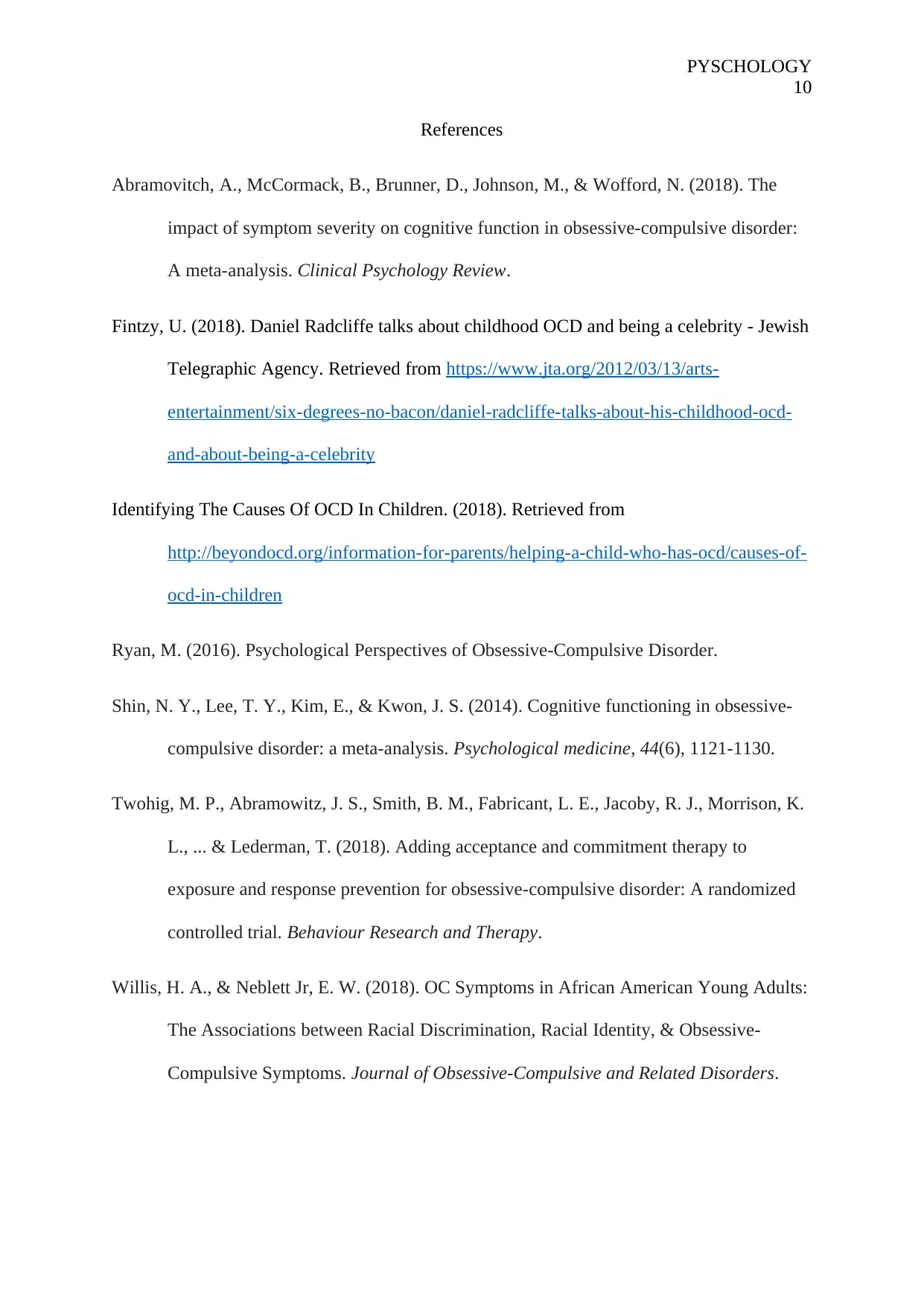
PYSCHOLOGY
10
References
Abramovitch, A., McCormack, B., Brunner, D., Johnson, M., & Wofford, N. (2018). The
impact of symptom severity on cognitive function in obsessive-compulsive disorder:
A meta-analysis. Clinical Psychology Review.
Fintzy, U. (2018). Daniel Radcliffe talks about childhood OCD and being a celebrity - Jewish
Telegraphic Agency. Retrieved from https://www.jta.org/2012/03/13/arts-
entertainment/six-degrees-no-bacon/daniel-radcliffe-talks-about-his-childhood-ocd-
and-about-being-a-celebrity
Identifying The Causes Of OCD In Children. (2018). Retrieved from
http://beyondocd.org/information-for-parents/helping-a-child-who-has-ocd/causes-of-
ocd-in-children
Ryan, M. (2016). Psychological Perspectives of Obsessive-Compulsive Disorder.
Shin, N. Y., Lee, T. Y., Kim, E., & Kwon, J. S. (2014). Cognitive functioning in obsessive-
compulsive disorder: a meta-analysis. Psychological medicine, 44(6), 1121-1130.
Twohig, M. P., Abramowitz, J. S., Smith, B. M., Fabricant, L. E., Jacoby, R. J., Morrison, K.
L., ... & Lederman, T. (2018). Adding acceptance and commitment therapy to
exposure and response prevention for obsessive-compulsive disorder: A randomized
controlled trial. Behaviour Research and Therapy.
Willis, H. A., & Neblett Jr, E. W. (2018). OC Symptoms in African American Young Adults:
The Associations between Racial Discrimination, Racial Identity, & Obsessive-
Compulsive Symptoms. Journal of Obsessive-Compulsive and Related Disorders.
10
References
Abramovitch, A., McCormack, B., Brunner, D., Johnson, M., & Wofford, N. (2018). The
impact of symptom severity on cognitive function in obsessive-compulsive disorder:
A meta-analysis. Clinical Psychology Review.
Fintzy, U. (2018). Daniel Radcliffe talks about childhood OCD and being a celebrity - Jewish
Telegraphic Agency. Retrieved from https://www.jta.org/2012/03/13/arts-
entertainment/six-degrees-no-bacon/daniel-radcliffe-talks-about-his-childhood-ocd-
and-about-being-a-celebrity
Identifying The Causes Of OCD In Children. (2018). Retrieved from
http://beyondocd.org/information-for-parents/helping-a-child-who-has-ocd/causes-of-
ocd-in-children
Ryan, M. (2016). Psychological Perspectives of Obsessive-Compulsive Disorder.
Shin, N. Y., Lee, T. Y., Kim, E., & Kwon, J. S. (2014). Cognitive functioning in obsessive-
compulsive disorder: a meta-analysis. Psychological medicine, 44(6), 1121-1130.
Twohig, M. P., Abramowitz, J. S., Smith, B. M., Fabricant, L. E., Jacoby, R. J., Morrison, K.
L., ... & Lederman, T. (2018). Adding acceptance and commitment therapy to
exposure and response prevention for obsessive-compulsive disorder: A randomized
controlled trial. Behaviour Research and Therapy.
Willis, H. A., & Neblett Jr, E. W. (2018). OC Symptoms in African American Young Adults:
The Associations between Racial Discrimination, Racial Identity, & Obsessive-
Compulsive Symptoms. Journal of Obsessive-Compulsive and Related Disorders.
Paraphrase This Document
Need a fresh take? Get an instant paraphrase of this document with our AI Paraphraser

PYSCHOLOGY
11
Appendix
Appendix A: Article about Daniel Radcliffe talks about childhood OCD and being a celebrity
https://www.jta.org/2012/03/13/arts-entertainment/six-degrees-no-bacon/daniel-radcliffe
talks-about-his-childhood-ocd-and-about-being-a-celebrity
11
Appendix
Appendix A: Article about Daniel Radcliffe talks about childhood OCD and being a celebrity
https://www.jta.org/2012/03/13/arts-entertainment/six-degrees-no-bacon/daniel-radcliffe
talks-about-his-childhood-ocd-and-about-being-a-celebrity
1 out of 11
Your All-in-One AI-Powered Toolkit for Academic Success.
+13062052269
info@desklib.com
Available 24*7 on WhatsApp / Email
![[object Object]](/_next/static/media/star-bottom.7253800d.svg)
Unlock your academic potential
Copyright © 2020–2026 A2Z Services. All Rights Reserved. Developed and managed by ZUCOL.
